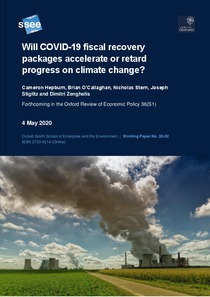Will COVID-19 fiscal recovery packages accelerate or retard progress on climate change?

Hepburn, Cameron ; O'Callaghan, Brian ; Stern, Nicholas ; Stiglitz, Joseph E. ; Zenghelis, Dimitri
Oxford University. Smith School of Enterprise and the Environment
SSEE - Oxford
2020
48 p.
epidemic disease ; economic recovery ; fiscal policy ; climate change
Smith School Working Paper
20-02
Environment
https://www.smithschool.ox.ac.uk/
English
Bibliogr.;Statistics
"The COVID-19 crisis is likely to have dramatic consequences for progress on climate change. Imminent fiscal recovery packages could entrench or partly displace the current fossil-fuel-intensive economic system. Here, we survey 231 central bank officials, finance ministry officials, and other economic experts from G20 countries on the relative performance of 25 major fiscal recovery archetypes across four dimensions: speed of implementation, economic multiplier, climate impact potential, and overall desirability. We identify five policies with high potential on both economic multiplier and climate impact metrics: clean physical infrastructure, building efficiency retrofits, investment in education and training, natural capital investment, and clean R&D. In lower- and middleincome countries (LMICs) rural support spending is of particular value while clean R&D is less important. These recommendations are contextualised through analysis of the short-run impacts of COVID-19 on greenhouse gas curtailment and plausible medium-run shifts in the habits and behaviours of humans and institutions."
Digital
The ETUI is co-funded by the European Union. Views and opinions expressed are however those of the author(s) only and do not necessarily reflect those of the European Union or the ETUI.